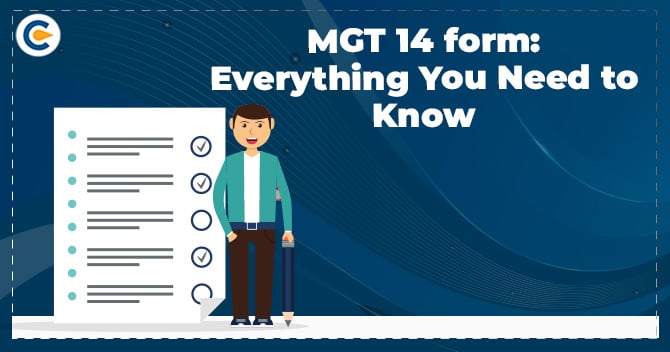MGT form was introduced to file certain resolutions with RoC. Such resolutions usually find their way to MGT 14 after getting approval of company’s members in the meeting. This write-up pens down the resolutions to be filed via MGT 14 form.
Categories of Filing Resolutions
Companies are obligated to file following categories of resolution via MGT 14 form:
- Board Resolutions
- Special resolutions
- Ordinary Resolutions
A board resolution is filed in Annexure A. Similarly; a special resolution is filed in Annexure B & the ordinary resolutions in Annexure C.
Let us know more about them in the following sections.
Annexure A – Board Resolution
Annexure A must be filed by every incorporated company other than a private limited company. Private limited entities acting as subsidiaries of public limited companies must comply with this requirement.
The list below encloses the type of board resolutions that should be filed in MGT 14 form:
- To issue securities debentures, either domestically or abroad. It’s worth noting that in the case of shares, the issuance of security refers to the issue of a Letter of Offer.
- To borrow funds from any identified sources, including a director.
- To invest the company’s funds (also comply with norms of Section 186)
- To issue loans or facilitate guarantees or security concerning loans. (Also comply with norms of Section 186)
- To endorse the Board’s report and financial statement
- To Appoint Secretarial Auditor.
- To appoint internal auditors.
- To appoint or remove top management personnel.
- To make political contributions.
- To take decisions for shareholders relating to the sum outstanding on their shares.
- To sanction buyback of securities u/s 68.
- To expand the company’s business
- To endorse Amalgamation, Reconstruction or Merger.
- Take over a company or acquire a controlling or gain a stake in another company.
Annexure B – Special Resolution
Annexure B seeks filing of the following special resolutions;
1. For companies incorporated u/s 8 to convert into another type of company or alter its AOA and MOA.
2. Change of the company’s registered office located in the same state, but outside the local vicinity of the location where it is presently situated.
3. Change a company’s registered office from the jurisdiction of one Registrar to another in the same state.
4. Amendment of Articles of privately held entity to entrench any provisions. All the members must approve this.
5. Change in the company’s name to be approved via a special resolution.
6. If a company has procured a public-based fund via issuance of a prospectus, and the fund so procured remains unused, the company is not liable to alter the object against which the fund was raised, except by passing a special resolution.
7. A company is not allowed to alter the contract’s terms referred to in an object or prospectus for which the prospectus was issued, except with the consent of the competent authority.
8. A company is liable to pass a special resolution via general meeting issue depository receipts in any overseas nation as per the pertinent conditions
9. If the company’s share capital is classified into many classes of shares, the rights available to the shares of any class may be modified with the writ permission of the concerned shareholders; or via a special resolution.
10. Private offer of companies requires the company’s permission via a special resolution.
11. Issuance of ‘Sweat Equity Shares”.
12. Reduction of share capital.
13. Special resolution for scheme endorsement for the purchase of fully-paid shares for the growth of the employees.
14. Buyback of shares.
15. A company can issue debenture along with an alternative of converting debentures into shares, either partly or wholly during the redemption phase, on the conditions that the operation is approved by a special resolution passed in the general meeting.
16. Maintain registers at any other address.
17. Re-appointment of Autonomous Director.
18. The company’s members have the right to specify any lesser no. of entities in which the company’s directors may serve as directors. The specification can only be done post the approval via a special resolution.
19. To sell, lease, or dispose of the company’s undertakings, wholly or partly.
20. To invest the compensations accessible to the company owing to amalgamation or merger in trust securities.
21. To borrow funds, where the prospective borrowable sum and the money previously borrowed surpasses the total of paid-up share capital & free reserves, except for the temporary loans secured via the company’s banker.
22. To remit or confer time for the debt’s repayment owed by the director
23. To sanction scheme for facilitating loans to MD or WTD
24. Loan & investment by the company which is higher than 60 per cent of paid-up share or 100 per cent of free reserve
25. Recruitment of a candidate as a manager, given that his/her age is above seventy years.
26. Remuneration to managerial personnel in case of inadequate profits
27. Special resolution relating to the closure of the company by Tribunal
28. Special resolution for closure of the company.
29. Conversion of a private ltd co into a One Person Company.
Annexure C – Ordinary Resolutions
This annexure seeks inclusion of the following ordinary resolutions:
1. Name change as per the Registrar’s discretion if the application for name reservation was applied by utilizing invalid information
2. Name change as per the Central Government’s discretion.
3. Issue of equity shares under differential rights require to be supported by an ordinary resolution
4. A company is permitted to escalate its capital, or on the contrary, escalate or consolidate its capital, or sub-divide or revoke shares which have not been acquired, provided that such action is supported by its Articles.
5. A private company cannot offer shares to employees under the employee’s stock option scheme, except on the shareholders’ consent via a special resolution.
6. To transact the consideration relating to financial statements and the BOD report, auditor report, dividends declaration, fulfilling directorship’s position vacated due to completion of service tenure, and determining the auditors’ remuneration in the AGM under a special resolution.
7. Consent of general meeting for the issuance of bonus shares.
8. Consent of general meeting for advocating deposits from members.
9. Auditor(s) appointment
10. Appointment of branch auditors.
11. Appointment of the autonomous director.
12. Appointment of a director via small shareholders.
13. Appointment of directors at the first general meeting or on the proposal of an individual with a deposit of Rs 1, 00,000.
14. Cost auditor’s remuneration shall come to effect via an ordinary resolution at the general meeting.
15. Ordinary resolution for drawing a contract with any third-party companies with underlying paid-up capital or transactions that surpass the prescribed amount.
16. To mention any transactions which is non-monetary wherein the company’s directors or subsidiary or associate company are involved
Time Frame for filing MGT 14 form
MGT 14 form should be filed with the Registrar of Company within thirty days from the date of the resolution or agreement’s formulation.
Penalties for delay filing of MGT 14 Form
Failure to submit the resolution under sub-section (1) of section 117 prior to the expiration of the duration cited under Section 403 shall attract the following penalties.
| Defaulting Party | Penalty |
| Company | Minimum: Rs 1,00,000 towards the failure remains post to the first one: Rs 500 per day Maximum: Rs 25 lakh |
| Every Officer in Default (Including the Liquidator of the Company) | Minimum: Rs 50,000 towards the failure prevail posts to the first one: Rs 500 per day Maximum: Rs 5 lakh |
Consequences for non-filing of MGT-14 within 300 days from passing of resolution
In such a scenario, the company cannot file MGT-14 form. It’s because this form seeks details of SRN of INC-28 and the same can be filed only after receiving a condonation order. It’s noteworthy that the Ministry of Corporate Affairs[1] holds the power of condonation.
Steps to be followed by concerned company for condonation of delay
- File CG-1 with MCA requesting condonation in delay
- MCA shall set out a fine in the condonation order and intimate the same with the applicant
- Upon receiving the order and submitting the fine, the company shall file a order’s copy along with the penalty receipt via form INC-28 with ROC.
- The company shall then file MGT 14 by enclosing SRN of INC-28
Conclusion
Filing MGT 14 with MCA implies that the critical decisions of the company cannot remain undercover. Companies are mandated to share decisions passed through resolutions with the authority. Any disagreement with this requirement shall lure significant fines for the company.
Read our Article:Register of Members under the Companies Act, 2013











